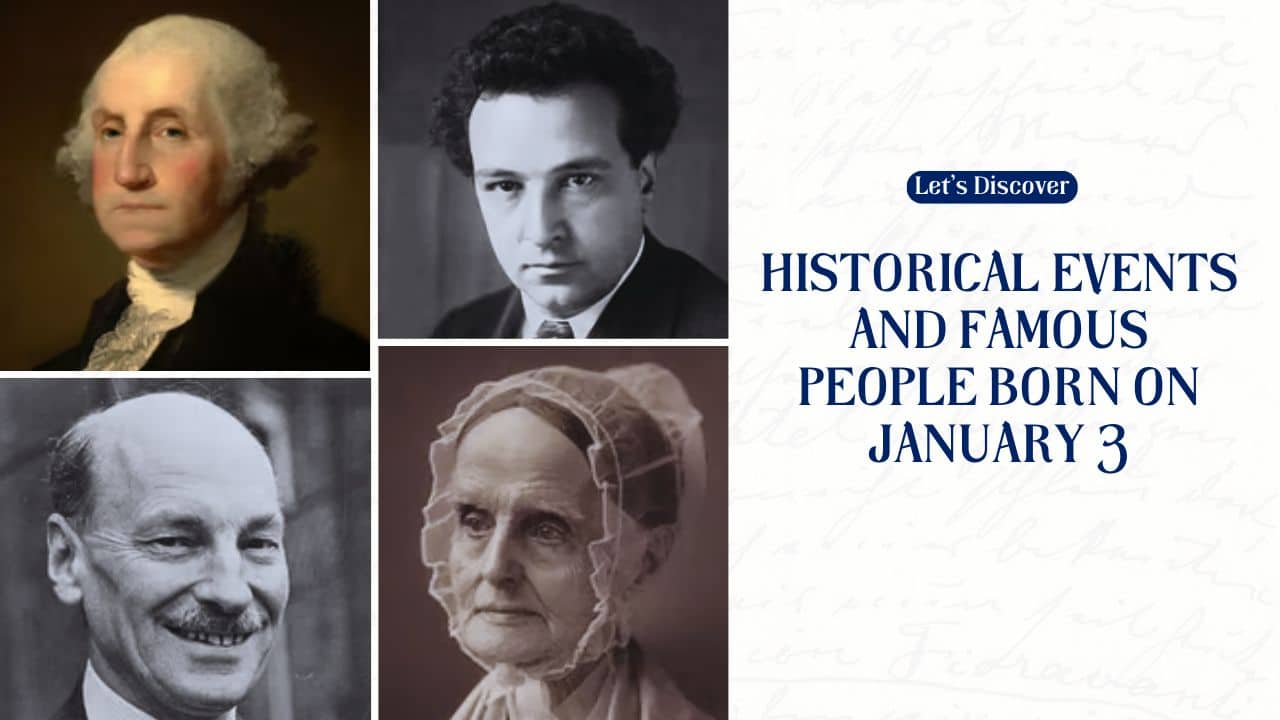January 3 holds a special place in history. It is a day filled with remarkable events and the birthdays of extraordinary individuals who shaped the world. From significant battles to groundbreaking innovations, this day has a rich history worth exploring.
Let’s dive into the key moments and influential people connected to January 3.
Historical Events of January 3
1. Leonardo da Vinci’s Flying Machine (1496)
Leonardo da Vinci, a great artist and inventor, tested his flying machine on this day in 1496. He was fascinated by the idea of human flight and designed a device inspired by bird wings. Unfortunately, his invention did not succeed, but it paved the way for future aviation. Da Vinci’s flying machine showed the power of imagination and innovation, even when failure occurs.
2. The Battle of Princeton (1777)
On January 3, 1777, General George Washington led his troops to victory against the British at the Battle of Princeton. This battle was part of the American Revolutionary War. Washington’s army surprised the British forces, boosting morale among his soldiers and American colonists. This victory helped build support for independence from Britain.
3. Stephen F. Austin Granted Land in Texas (1823)
Stephen F. Austin, often called the “Father of Texas,” received a land grant from Mexico on January 3, 1823. He brought settlers to Texas, helping it grow. This grant laid the foundation for Texas’ journey toward becoming a U.S. state. Austin’s leadership shaped Texas’ history and development.
4. Construction of the Brooklyn Bridge Begins (1870)
On January 3, 1870, construction of the Brooklyn Bridge started. The bridge, connecting Manhattan and Brooklyn, was one of the most challenging engineering projects of its time. Designed by John Roebling, it took 13 years to complete. The Brooklyn Bridge became an iconic symbol of American ingenuity.
5. Premiere of “Chant de Nigamon” by Arthur Honegger (1920)
Arthur Honegger, a Swiss-French composer, premiered his symphonic poem Chant de Nigamon in Paris on January 3, 1920. This musical piece was inspired by Native American culture. It showcased Honegger’s talent and became an important work in classical music history.
Famous Birthdays of January 3
1. Cicero (106-43 BC)
Cicero was a Roman statesman, lawyer, and philosopher. He was known for his speeches and writings, which influenced law, politics, and philosophy. Cicero believed in justice and fairness, and his works are studied even today.
| Detail | Information |
|---|---|
| Full Name | Marcus Tullius Cicero |
| Born | January 3, 106 BC, Arpinum, Italy |
| Died | December 7, 43 BC |
| Known For | Philosophy, Rhetoric, Politics |
| Famous Works | On the Republic, On Duties |
2. Lucretia Mott (1793-1880)
Lucretia Mott was a Quaker, abolitionist, and women’s rights activist. She played a major role in the first Women’s Rights Convention in 1848. Mott dedicated her life to fighting for equality and justice.
| Detail | Information |
|---|---|
| Full Name | Lucretia Coffin Mott |
| Born | January 3, 1793, Nantucket, Massachusetts |
| Died | November 11, 1880 |
| Known For | Abolitionism, Women’s Rights |
| Famous Contribution | Co-organizing the Seneca Falls Convention |
3. Ernest Renshaw (1861-1899)
Ernest Renshaw was a British tennis player known for his success at Wimbledon. Alongside his twin brother William, he dominated men’s doubles. He also won the singles championship in 1888.
| Detail | Information |
|---|---|
| Full Name | Ernest Renshaw |
| Born | January 3, 1861, Leamington Spa, England |
| Died | September 2, 1899 |
| Known For | Tennis Achievements |
| Famous Wins | Wimbledon Singles (1888), Doubles Champion (1884-89) |
4. Clement Attlee (1883-1967)
Clement Attlee was the Prime Minister of the United Kingdom from 1945 to 1951. He led major reforms, including the creation of the National Health Service (NHS). His leadership helped rebuild the UK after World War II.
| Detail | Information |
|---|---|
| Full Name | Clement Richard Attlee |
| Born | January 3, 1883, Putney, London |
| Died | October 8, 1967 |
| Known For | Prime Minister, Welfare State Creation |
| Key Contributions | Establishment of the NHS, Post-War Reconstruction |
5. Ngô Đình Diệm (1901-1963)
Ngô Đình Diệm was the first President of South Vietnam. He led the country during a critical time but faced criticism for his authoritarian rule. His leadership influenced the early stages of the Vietnam War.
| Detail | Information |
|---|---|
| Full Name | Ngô Đình Diệm |
| Born | January 3, 1901, Quảng Bình, French Indochina |
| Died | November 2, 1963 |
| Known For | President of South Vietnam |
| Legacy | Early Leadership in Vietnam War |
Lesser-Known Facts About January 3
- First Radio Broadcast of “March of Time” (1931): This was a famous American radio news series that aired on January 3, 1931.
- Alaska Becomes the 49th State (1959): The United States officially added Alaska as its 49th state on this date.
Reflection on the Importance of January 3 in History
The events and individuals connected to January 3 remind us of humanity’s capacity for innovation, leadership, and social change. From da Vinci’s ambitious dreams to Cicero’s wisdom, each moment and figure offers lessons in resilience and vision.
Takeaway
January 3 is a day rich in history and filled with remarkable stories of triumph, innovation, and leadership. The events that happened and the people born on this day have left a lasting impact on the world. By exploring these moments, we gain a deeper appreciation for history’s role in shaping our lives.
References
- Da Vinci’s Flying Machine: History.com
- Battle of Princeton: American Battlefield Trust
- Stephen F. Austin: Texas State Historical Association
- Brooklyn Bridge Construction: Smithsonian Magazine
- Arthur Honegger’s Music: Oxford Music Online
- Cicero: Encyclopedia Britannica
- Lucretia Mott: National Women’s History Museum
- Ernest Renshaw: International Tennis Hall of Fame
- Clement Attlee: UK Parliament Official Website
- Ngô Đình Diệm: BBC History






































